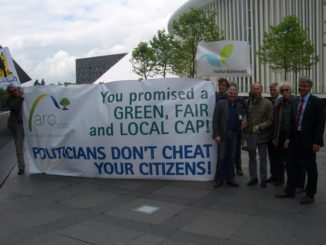
In the time since the Multi-Annual Financial Framework (MFF, or proposed EU budget 202-2027) was published a number of organisations and individuals have commented on the implications for the CAP – the common agricultural policy.
You can read ARC2020’s initial reaction here
Full text of MFF proposal published 2nd May 2018
A modern budget for a Union that protects, empowers and defends (Commission Press release 2nd May )
Financial and environmental considerations have been to the fore in much of this commentary and analysis. There is, it seems a lot of eco-spin and not a lot of public goods substance in what the Commission is proposing with regard to CAP.
IEEP
The Institute for European Environmental Policy (IEEP) were out early with their analysis on 3rd May. This analysis is worth reading in part because it clearly outlines the overall stages and process of the budget process. Their summary points:
- Some positive steps – particularly an increased focus on climate-relevant spending.
- Commission needs to follow through on its rhetoric about a “budget focused on results”.
- And the Common Agricultural Policy proposals – focusing cuts on vital rural development and agri-environment spending rather than on less-targeted direct payments – are disappointing.
Importantly, their point out that “much will depend, though, on the detail of the Commission’s legislative proposals. And this is just the start of a long process of negotiation, both complicated and simplified by the UK’s departure.”
In this context, the positivity mentioned in their first bullet point on climate change appears to be optimistic – for this is an “increased focus” and an increase in the amount “notionally spent” from 20-25%. This is not strict, and its also not clear if this refers to mitigation or adaptation. And that’s before the final stages of the process.
Moreover, it is not clear how private sector investment will be encouraged in InvestEU; 75% of the Ag budget remains non subject to climate targets; and the LIFE funding, while increased, remains very small as an overall proportion of the budget.
While laudable, it seems IEEP are trying to find positives, but are certain of negatives, in this MFF proposal.
IEEP state: “The CAP cuts seem to have been disappointingly focused on the more worthwhile rural development and agri-environment support, rather than on direct payments to farmers…which is clearly not consistent with the Commission’s overall message about better targeting and EU added value, or with the 2016 Cork 2.0 declaration’s focus on the rural environment, natural resources, and rural vitality.”
IEEP also emphasise cohesion funding allocated principally based on “the reception and integration of migrants, and climate change” as noteworthy, along side rule of law changes which may prevent blocking by populist governments. It also notes the attempt at capping at E60,000 (without the UK blocking) and in particular the (disproportionately high) level of the rural development cuts. Finally the single rulebook proposal – which is of course a simplification – may well be opposed by individual member states. This is because, whatever about the rhetoric of wanting simplification, when simplification gets specific, suddenly MS’s want exemptions, which of course adds complexity – as it ever has been.
A more recent IEEP post – by David Baldock and Allan Buckwell – (16th May) does more to emphasise the problems with current CAP proposals. While CAP has in recent decades somewhat balanced agricultural support and societal expectations, this new proposal suggests “that the Commission is ready to more or less abandon the public goods strand of this strategy”. As they state – “the gap between expressed intentions and mechanisms proposed is so large as to be alarming.”
The pair suggest four specific proposals:
- Secure sufficient funding for environmental measures in Pillar 1. “The proposed eco-scheme must be a mandatory part of all Member State CAP strategic plans and represent a significant part of the EAGF envelope (at least 30%).”
- Sharpen the specific objectives that will be used for setting targets and monitoring progress by Member States under the New Delivery Model. “None of the proposed CAP specific objectives in the current proposals are framed in a results-oriented manner”
- Give Member States greater flexibility to transfer funds from Pillar 1 for environmental spending in Pillar 2. “Proposed cuts to the Pillar in real terms risk undermining investments in so called ‘dark green’ measures in many Member States, especially those with limited resources…suggestions that the hole in Pillar 2 funding will be filled by higher contributions from national expenditure do not seem very realistic in many cases…transfers should remain 100% EU financed in Pillar 2.”
- Funding for Areas facing Natural Constraints should be under Pillar 1, not Pillar 2. “Given the proposed cuts in Pillar 2 funding and the increased national co financing rates, there is a high risk that many Member States will feel obliged to maintain ANC funding and be forced to reduce expenditure on more targeted agri-environment measures to pay for it. To avoid this, and to improve the sustainability of the future CAP, ANC support should instead be offered under Pillar 1 in the form of a direct payment top-up.”
EPC
Taking a broader approach, Annika Hedberg (Head of Programme ‘Sustainable Prosperity for Europe’ & Senior Policy Analyst)of the European Policy Centre also had much to be critical of.
Fundamentally, and despite the huge challenges the EU faces, the MFF proposal, by only “moderately reducing” CAP spending, is all about “perpetuating current structures and the status quo” she says. She criticised “subsidies that are evidently harmful for people’s wellbeing, health, the environment and climate” …”unconditional direct income support to farmers is manifestly absurd in today’s world when it maintains uncompetitive farming practices that have negative implications for the climate, the environment or people’s health”.
4 NGOs with 5 CAP problems
Four CAP Environmental NGOs – European Environmental Bureau (EEB)
Greenpeace EU, BirdLife Europe and WWF EU wrote a joint letter railing against CAP spending plans on 8th May.
The five issues cited:
- Dropping the 30% ring fenced greening component – without replacing it with anything specific in Pillar one.
- What is refereed to as ‘enhanced’ conditionality should include all environmental directives, such as water, emissions, pesticides and birds/habitats directives.
- The new regulation must include clear safeguards to prevent CAP money being spent on “perverse subsidies that will cause environmental, climate and economic damage over the short and long run.” (Previous examples include investment support and coupled spending, while livestock is cited as requiring “special care” in assessment.)
- MS CAP plan submissions need to be given enough time, and to be of a high enough environmental standard, to be approved. The current timeframe is too short, the NGOs claim. Moreover the Commission must have “the ability to only approve the parts of the plan” that are up to standard.
- If there is, as is suggested, a more to results ,then these results must be assessed using “scientifically sound indicators and monitoring systems”, including at MS level.
Read the Environmental NGO’s CAP Letter from 8th May (pdf)
Alan Matthews curbs capping enthusiasm
The PR people in the European Commission must worry when they see Alan Matthews has a new blog post out. These days, this means the washing machine has been unplugged, so the spin cycle cannot be completed. Not only was the agri-economist one of the first to eviscerate the messaging on projected CAP spending – in particular on Pillar 2, which will see cuts of up to 26% he found – he has also poured cold water on the idea that capping very high payments will do anything significant.
His 11th May post on capping shows how, with so many exceptions and exemptions, capping top payments at E60,000 may do little in reality. Matthews cited the draft (which we leaked) and its reference to salary deductions to be applied. Moreover, the draft proposed that this salary loophole be extended “to also include the imputed value of own family labour engaged on the farm” he says.
He adds: “Specifically, the draft states that Member States shall also deduct “the equivalent cost of regular and unpaid labour linked to an agricultural activity practiced by persons working on the farm concerned who do not receive a salary (or who receive less remuneration than the amount normally paid for the services rendered) but are rewarded through the economic result of the farm business”.”
This, he claims, makes capping as currently proposed “meaningless”. It also makes statements by both Commissioner Hogan and President Junker – that direct payments in future will be concentrated on small and medium-sized farms – “without foundation and misleading”.
AG MEPs want it all
Meanwhile, Ag MEPs, adopting the Dorfmann report yesterday, claim to want:
-
no to renationalisation of the EU farm policy and cuts to its budget
-
farming activities in all member states to be subject to same EU high standards
-
fairer funding across the EU and within member states
-
further measures to attract new entrants and to help farmers deal with crises
On first glance, much of this seems sensible, if somewhat euphorically optimistic in a context of to the realities of less available cash. Further analysis will be done by our team before commenting in detail.
And finally, if you’d like to learn more about what the CAP cuts might really be – difficult and all a task that is – checkout this detailed post by Bruegel which suggests real time cuts of 15%, not 4% as the Commission claimed initially.





